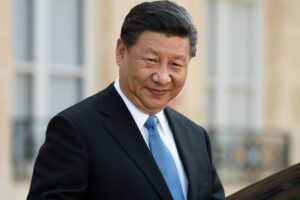China has been cautioned against retaliating to President Trump’s aggressive new tariff regime by offloading its massive holdings of US government bonds — a move that analysts warn could damage its own economy more than it harms Washington.
Earlier this month, Trump imposed sweeping tariffs of up to 145 per cent on Chinese exports to the US, sparking fears of a renewed economic confrontation between the world’s two largest economies. The drastic escalation has led to speculation that Beijing could strike back by selling off a significant portion of its US treasuries, a strategy that could destabilise American financial markets by pushing bond yields even higher.
However, analysts are urging restraint, warning that such a move would come with serious financial and strategic drawbacks for China itself.
“The concern is that China might dump its vast holdings of treasuries, even if that risked major side effects like racking up huge losses on its own portfolio and undermining its competitiveness against the US by driving the [yuan] renminbi back up against the dollar,” said John Higgins, chief markets economist at Capital Economics.
China is the second-largest foreign holder of US government debt after Japan, with more than $700 billion in longer-dated treasuries. Japan, by comparison, holds over $1 trillion. If Beijing were to significantly reduce its holdings, it could trigger panic across global markets already on edge over the US administration’s protectionist policies.
Bond yields, which rise as prices fall, have already surged to levels not seen since last October — a shift that has raised eyebrows among analysts. While some hedge funds have reportedly been forced to liquidate treasuries amid a spike in volatility, the speculation around China’s involvement remains inconclusive.
Data from the US Federal Reserve and Treasury suggests that China sold approximately $5 billion in US bonds in February, predating Trump’s so-called “liberation day” announcement on April 2. More recent movements are harder to trace with certainty, though analysts say there’s currently no hard evidence of a large-scale sell-off by Beijing this month.
According to Barclays, any bond sales by China are more likely linked to currency stabilisation efforts rather than a deliberate attempt to pressure US borrowing costs. That distinction is crucial, as Chinese authorities face mounting pressure to defend the yuan in the face of rising tariffs — but any major treasury liquidation could have the opposite effect by strengthening the currency and eroding export competitiveness.
China’s central bank and state-managed investment funds also hold an estimated $3 trillion in dollar-denominated assets. A US bond market crash would severely dent the value of those holdings, undermining broader financial stability in China at a time when growth is already slowing.
Meanwhile, traditional safe havens such as US bonds and the dollar have failed to provide shelter in the latest round of market turbulence. Both have experienced falling prices alongside American equities, suggesting a broader crisis of confidence in dollar-based assets.
As the standoff between Washington and Beijing intensifies, policymakers in both capitals may be forced to weigh short-term leverage against long-term economic consequences. For China, analysts say, a treasury dump may ultimately be more symbolic than effective — and potentially self-destructive.
Read more:
China warned against dumping US bonds as retaliation for Trump tariffs

